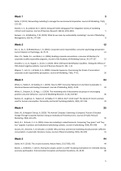Week 1 3
Kotler, P. (2011). Reinven ng marke ng to manage the environmental impera ve. Journal of Marke ng, 75(4),
132-135. 3
Stoeckl, V. E., & Luedicke, M. K. (2015). Doing well while doing good? An integra ve review of marke ng
cri cism and response. Journal of Business Research, 68(12), 2452-2463. 5
Kemper, J. A., & Ballan ne, P. W. (2019). What do we mean by sustainability marke ng?. Journal of Marke ng
Management, 35(3-4), 277-309 8
Week 2 12
Sen, S., Du, S., & Bha acharya, C. B. (2016). Corporate social responsibility: consumer psychology perspec ve.
Current Opinion in Psychology, 10, 70-75. 12
Ellen, P.S., Webb, D.J., and Mohr, L.A. (2006), Building corporate associa ons: consumer a ribu ons for
corporate socially responsible programs, Journal of the Academy of Marke ng Science, 34, 147-157. 15
Einwiller, S., Lis, B., Ruppel, C., & Sen, S. (2019). When CSR-based iden ca on back res: Tes ng the e ects of
CSR-related nega ve publicity. Journal of Business Research, 104, 1-13. 17
Wagner, T., Lutz, R. J., & Weitz, B. A. (2009). Corporate hypocrisy: Overcoming the threat of inconsistent
corporate social responsibility percep ons. Journal of Marke ng, 73(6), 77-91. 20
Week 3 24
White, K., Habib, R., & Hardisty, D. J. (2019). How to SHIFT Consumer Behaviors to be More Sustainable: A
Literature Review and Guiding Framework. Journal of Marke ng, 83(3), 22-49. 24
White, K., Simpson, B., & Argo, J. J. (2014). The mo va ng role of dissocia ve out groups in encouraging
posi ve consumer behaviors. Journal of Marke ng Research, 51 (4), 433-447. 30
Bas an, B., Loughnan, S., Haslam, N., & Radke, H. R. (2012). Don’t mind meat? The denial of mind to animals
used for human consump on. Personality and Social Psychology Bulle n, 38(2), 247-256. 33
Week 4 35
Eilert, M., & Nappier Cherup, A. (2020). The Ac vist Company: Examining a Company’s Pursuit of Societal
Change Through Corporate Ac vism Using an Ins tu onal Theore cal Lens. Journal of Public Policy &
Marke ng, 39(4), 461-476. 35
Reich, B. J., & Soule, C. A. A. (2016). Green de-marke ng in adver sements: Comparing “buy green” and “buy
less” appeals in product and ins tu onal adver sing contexts. Journal of adver sing, 45(4), 441-458. 39
Gossen, M., Ziesemer, F., & Schrader, U. (2019). Why and how commercial marke ng should promote su cient
consump on: A systema c literature review. Journal of Macromarke ng, 39(3), 252-269. 41
Week 5 44
Stahel, W. R. (2016). The circular economy. Nature News, 531 (7595), 435. 44
Böcker, L., & Meelen, T. (2017). Sharing for people, planet or pro t? Analysing mo va ons for intended sharing
economy par cipa on. Environmental Innova on and Societal Transi ons, 23, 28-39. 46
1
tititi ti ti ti ti ti ttti tititi ti ti titi ti tititi ti ti ti ti ti fititi titititifiti tititi ti tititititi fiti tt ti ti titi ff ffiti
, Sto erg, N., & Bridoux, F. (2019). Consumers' choice among peer-to-peer sharing pla orms: The other side of
the coin. Psychology & Marke ng, 36 (12), 1176-1195. 48
Hood, B. (2016). Make recycled goods covetable. Nature News, 531(7595), 438. 51
Article Presentation 52
Emma Beacom, Joe Bogue & Lana Repar (2021) Market-oriented Development of Plant-based Food and
Beverage Products: A Usage Segmenta on Approach, Journal of Food Products Marke ng, 27:4, 204-222 52
2
fb ti ti tfti
, Week 1
Kotler, P. (2011). Reinventing marketing to manage the environmental imperative.
Journal of Marketing, 75(4), 132-135.
In the past, the assumption of
in nite resources and zero
environmental impact dominated
the marketing practices; however,
the realisation of nite resources
and high environment costs require
a change in beliefs and practices.
Chances Regarding the 4 Ps:
1. Product: reconsidering materials and sources (carbon footprint), developing
sustainable packaging
2. Price: environmentally involved consumers may be willing to pay more, but
companies need to consider how their pricing will be a ected by possible new
regulations requiring them to cover more of the externality costs they created
3. Place: considering the location of production and distribution facilities, call for
more decentralised productions, reduction of consumers driving to outlets
through push in online shopping
4. Promotion: shifting from print to online, communication of sustainability, more
speci c product labelling
The Consumer Pressure: Why Change?
- marketing 1.0 (functional), marketing 2.0 (emotional) —> marketing 3.0 (socially
responsible)
- WoM growing force in shaping consumer decisions, and consumer trend towards
sustainability
- Diamond (2004) found evidence that consumers are willing to pay more for
environmentally friendly products
- LOHAS = “lifestyles of health and sustainability”
- B2B companies further removed from consumer pressure
3
fi fi fi ff
, Marketing Practices:
a. demarketing:
- uses same 4 Ps but in a reverse way, e.g. reducing industries and consumers’
water consumption due to the water shortage in California
- there are times and resources that demand conservations and reduction rather
than demand expansion (still main e ort of marketing)
b. social marketing:
- the theory and practice of marketing an idea, cause, or behavior
- spreading positive awareness and behavior, e.g. anti-smoking or alcohol
campaigns
Further Research Imperatives:
4
ff




